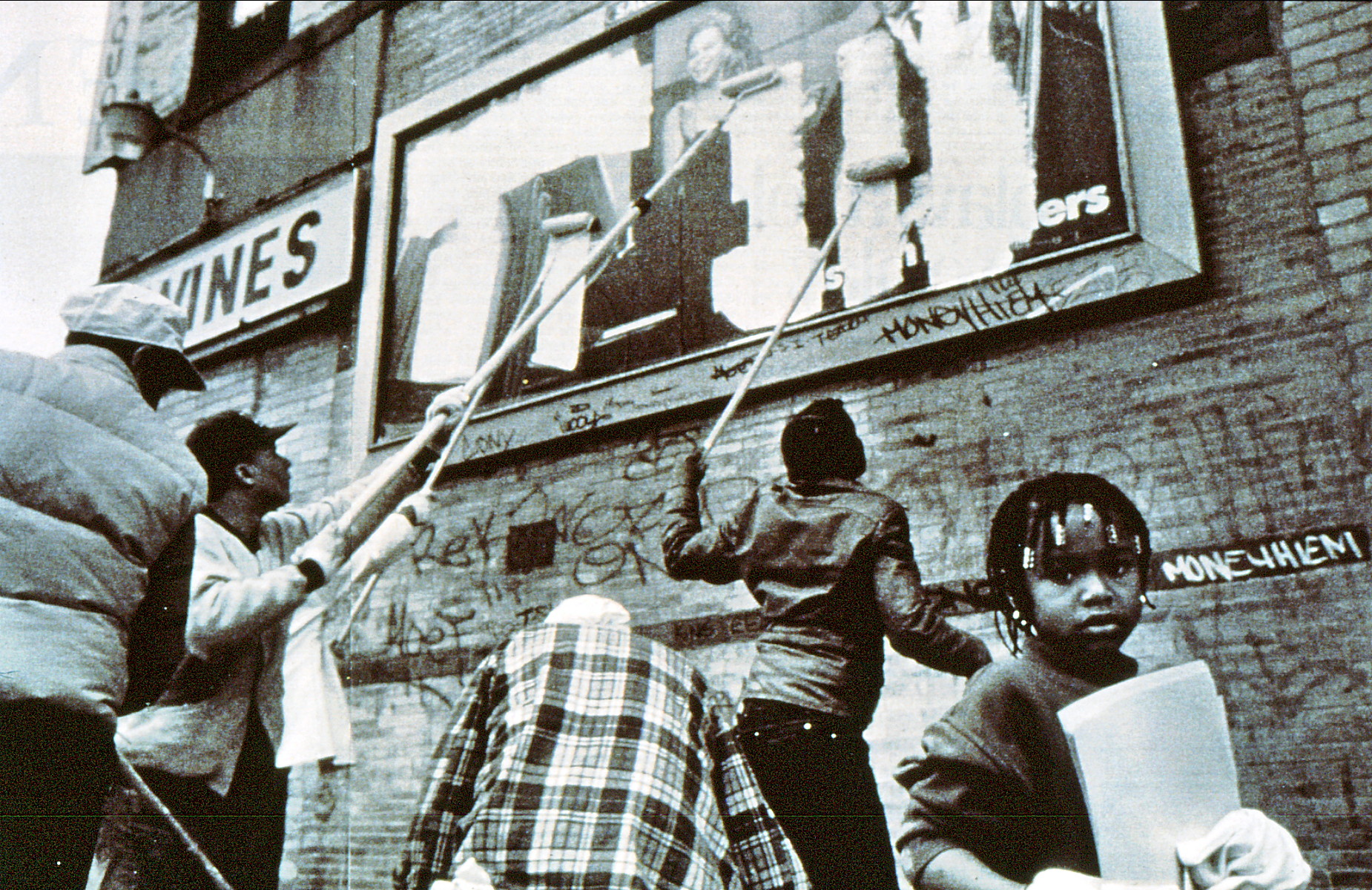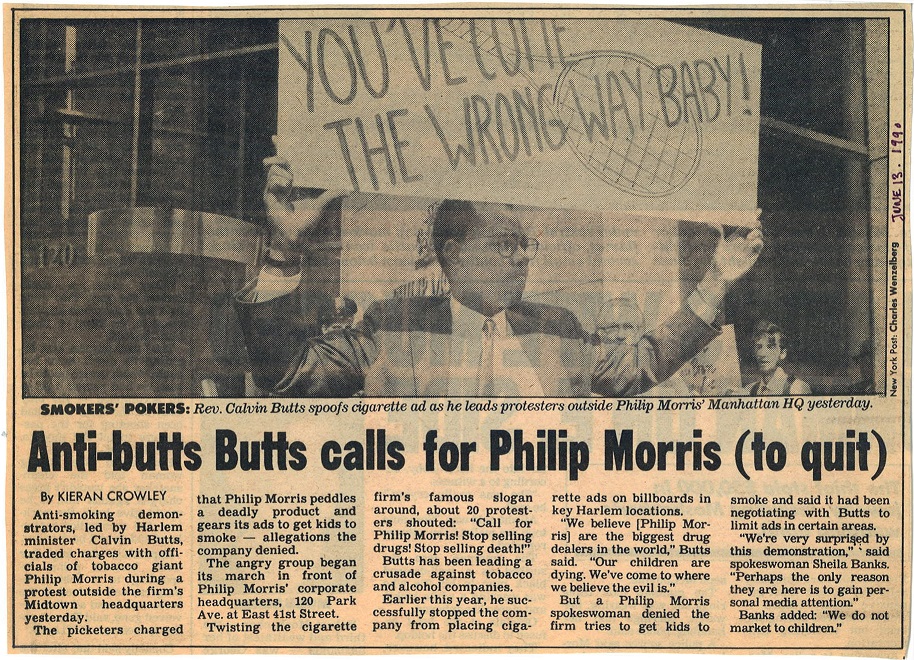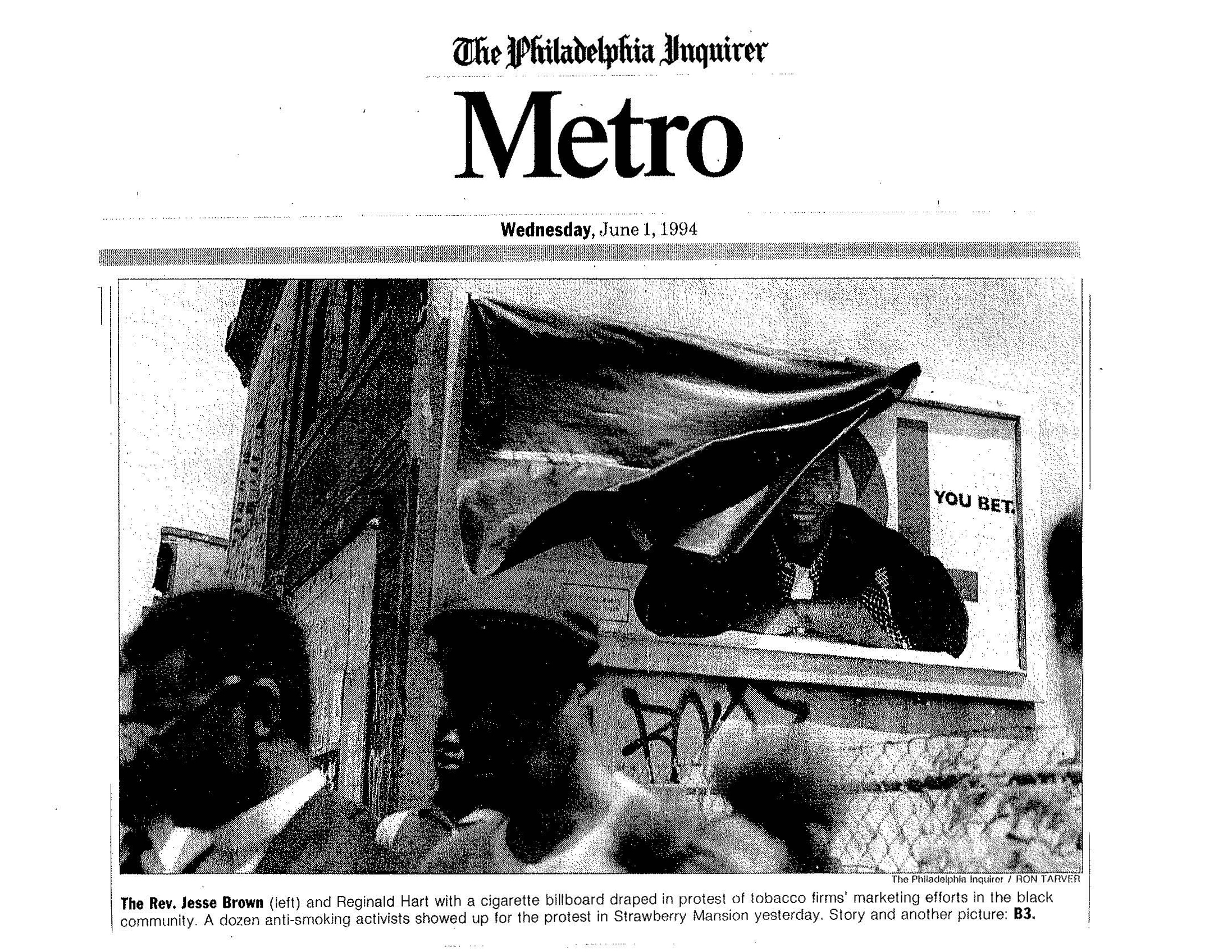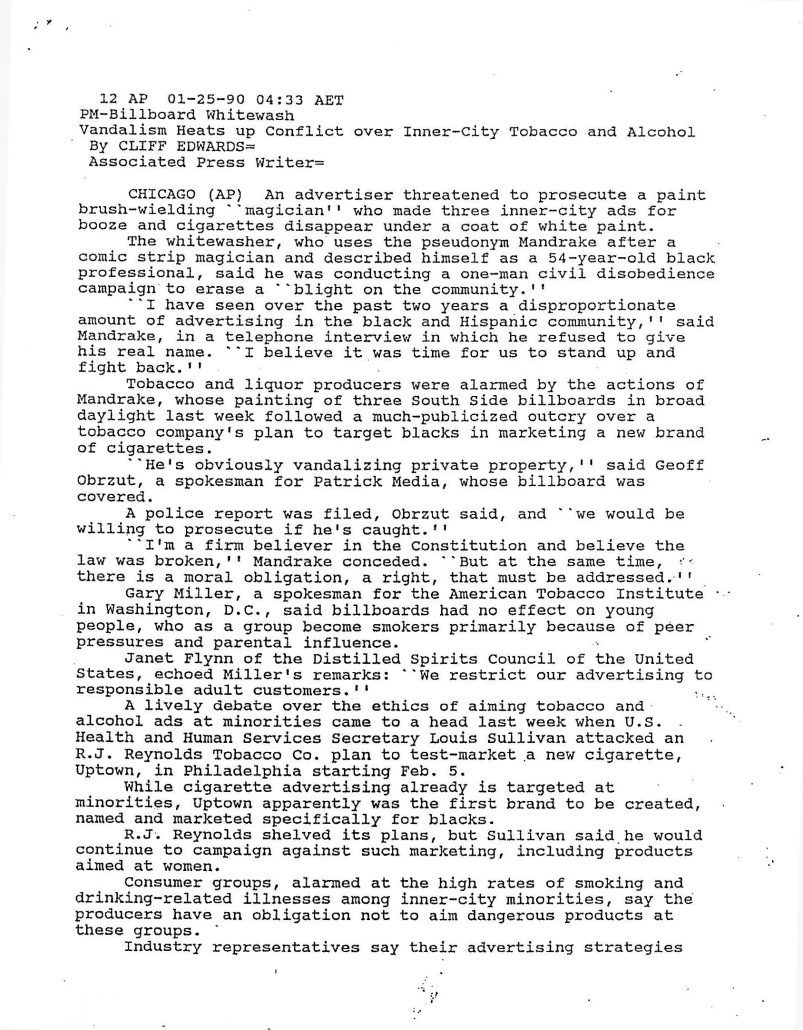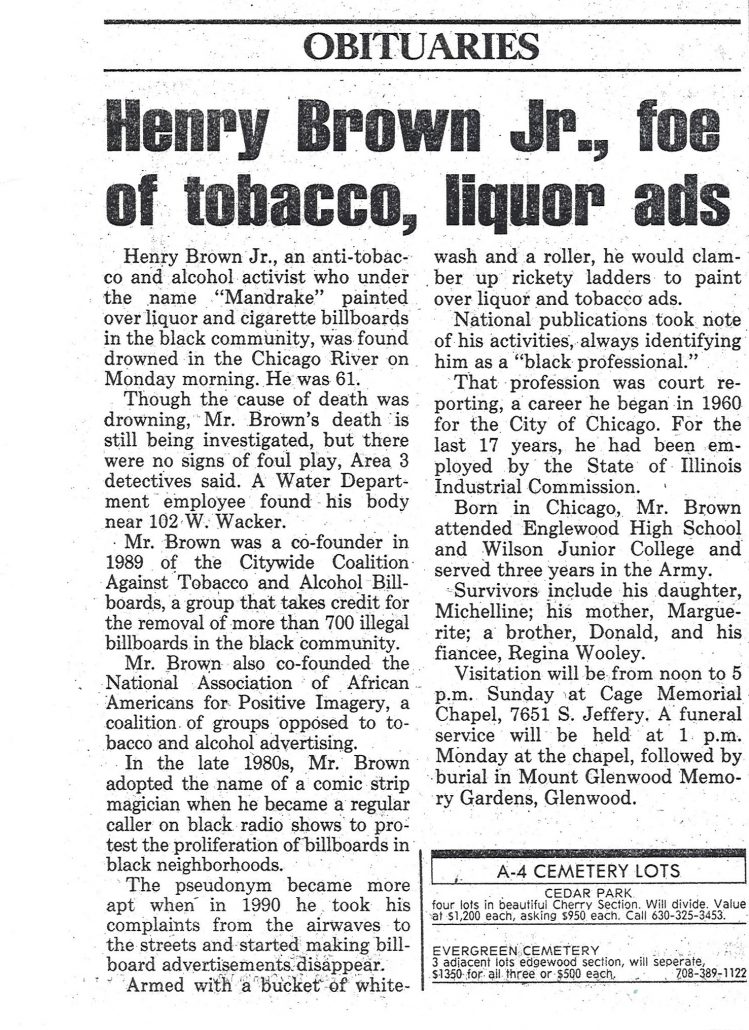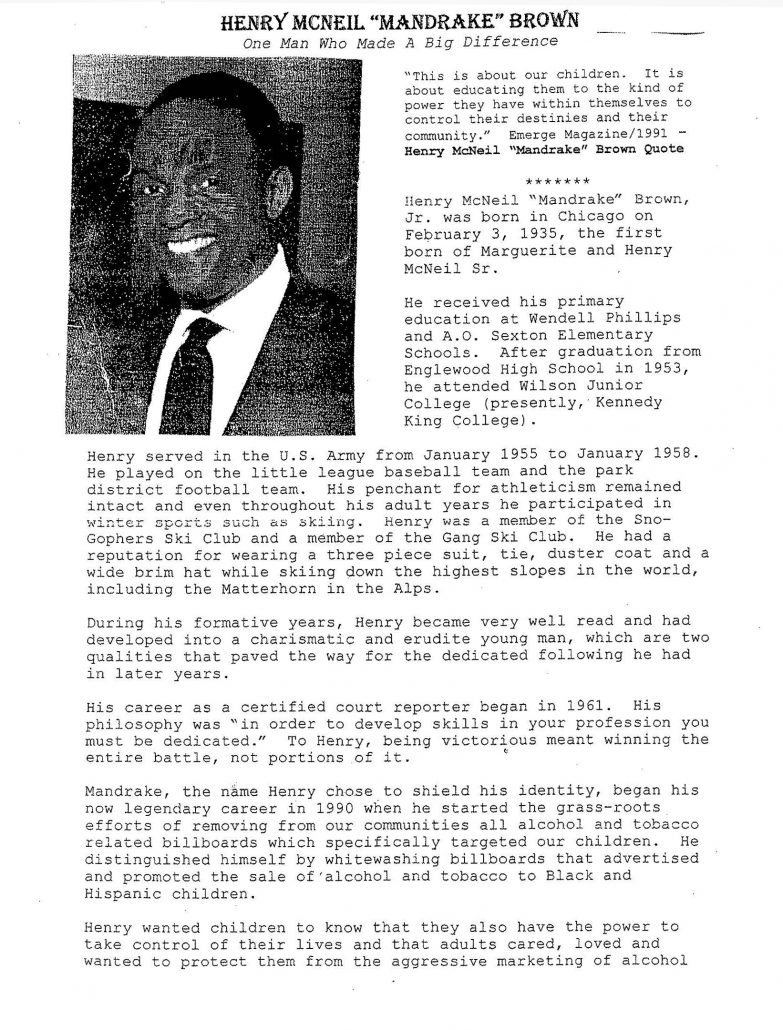- Minorities & Smoking – Home
- Taking Notice
- The Power of Tobacco Marketing ▼
- A History of Marketing Menthol to Minorities
- Supporting and Suppressing Minority Communities ▼
- Targeting Latinos
- Targeting Minority Women: A Marginalized Market
- Family Smoking Prevention and Tobacco Control Act
- The DOC Response
- Recent Struggles
Reverend Calvin Butts and associates defacing a billboard with white paint, Harlem, New York
Photograph
Circa 1990
“Anti-butts Butts calls for Philip Morris (to quit)”
News article by Kieran Crowley
New York Post
June 13, 1990
“A billboard is draped in mourning”
News article by Michael Sokolove
The Philadelphia Inquirer, pages B1 and B3
June 1, 1994
“Vandalism Heats Up Conflict over Inner-City Tobacco and Alcohol Ads”
News article by Cliff Edwards about the activism of Henry McNeil “Mandrake” Brown
January 25, 1990
“Henry Brown Jr., foe of tobacco, liquor ads”
Obituary of Henry McNeil “Mandrake” Brown
Chicago Sun-Times, page 35
September 28, 1996
Activists and Advocates
There have been several notable activists in the fight against tobacco use and promotion among African Americans, beginning in the 1980s:
- In 1990, Reverend Jesse W. Brown, Jr., a Lutheran pastor in Philadelphia, helped launch the Coalition Against Uptown Cigarettes (see Section 4.3). In 1991, he co-founded the National Association of African Americans for Positive Imagery (NAAAPI), which has led efforts to counter the promotion of unhealthy products targeted to African Americans. In 2018, Rev. Brown has attacked Swisher International, Inc., maker of Swisher Sweets cigars, for its aggressive marketing to African Americans in the form of concerts and in-store entertainment.
- Robert G. Robinson, DrPH, was for many years the leading African-American public health professional in tobacco prevention and control in the U.S. He chaired the first chapter of the National Black Leadership Initiative on Cancer and helped spearhead the Coalition Against Uptown Cigarettes. While at the Fox Chase Cancer Center in Philadelphia, he developed Pathways to Freedom, a state-of-the-art tobacco cessation guide for the African-American community. From 1993 to 2006, he served as Associate Director for Health Equity at the Centers for Disease Control and Prevention Office of Smoking and Health. During his tenure, the 50-year-long disparity of higher smoking rates among African Americans than non-African Americans was eliminated.
- Henry McNeil “Mandrake” Brown, Jr., a court reporter for the State of Illinois, singlehandedly whitewashed billboards promoting tobacco and alcohol products in Chicago’s African-American community. He also was a co-founder of the Citywide Coalition Against Tobacco and Alcohol Billboards in Chicago and of the National Association of African Americans for Positive Imagery. His pioneering efforts to counteract the targeting of African Americans by the tobacco industry were cut short by his untimely death in 1996.
- James Forde, Director of Health Services for San Diego County, California, in the 1980s was the first health official to put a no-smoking logo on his official stationery. He later resigned as head of the local Urban League chapter after refusing to promote the Kool Achiever Awards.
- John Wiley Price, County Commissioner for District 3 of Dallas, Texas, was one of the first elected officials to denounce the cigarette companies and their advertising in ethnic minority neighborhoods.
- Alberta Tinsley-Talabi (formerly Tinsley-Williams), who served in the Michigan House of Representatives, sought to ban tobacco and alcohol billboards in Detroit in 1989 when she served on the City Council. However, she was unable to obtain the support of the American Cancer Society because alcohol was not part of their agenda. Nevertheless, she helped persuade Michigan Congressman John Conyers to introduce a measure in the U.S. House of Representatives to ban tobacco and alcohol billboards in minority neighborhoods.
- Robert C. Newberry, a columnist for the Houston Post in the 1980s and 1990s, wrote several scathing columns on cigarette companies’ exploitation of the black community.
- James Muhammad, a reporter for The Final Call, published in Chicago by the Nation of Islam, wrote hard-hitting articles against the tobacco industry.
- Deloyd T. Parker, Jr., co-founder and executive director of SHAPE (Self-Help for African People through Education) Community Center in Houston, Texas, for over 46 years, took a stand against the tobacco industry by refusing to accept a $50,000 Kool Achiever Award.
- Father Michael Pfleger, a Roman Catholic priest in Chicago, long opposed exploitation of the African-American community by the tobacco and alcohol industries. His parish of more than 2,000 in the Auburn Gresham neighborhood on Chicago’s South Side largely consists of African-American congregants. Pfleger and members of his church took action by defacing tobacco and alcohol billboards, which led the Chicago City Council to vote to remove such ads from the Auburn Gresham neighborhood.
- Reverend Calvin Butts, pastor of the Abyssinian Baptist Church in Harlem, New York, led efforts to whitewash tobacco and alcohol billboards located in Harlem and picketed the corporate headquarters of Philip Morris Companies in New York City.
- Over more than 25 years in public health and tobacco control, Brenda Bell Caffee has led the California African American Tobacco Education Network in developing nationally recognized model community initiatives and is a founding Elder of the National African American Tobacco Prevention Network. She is the creator of the “Not in Mama’s Kitchen” Secondhand Smoke Eradication Program.
- Charyn D. Sutton was media coordinator of the Coalition Against Uptown Cigarettes, a contributing author to Pathways to Freedom, a founding member of the National Association of African Americans for Positive Imagery, and contributor to Tobacco Use Among U.S. Racial/Ethnic Minority Groups: A Report of the Surgeon General, published in 1998. She was called the “People’s Epidemiologist” because of her grasp of statistical trends and her commitment to translating and disseminating such information to the public.
- Sandra Headen, PhD, was a teacher and researcher at the University of North Carolina Gillings School of Global Public Health where she developed pioneering, youth-led smoking cessation programs. She also served as the first executive director of the National African American Tobacco Prevention Network.
- In 2000, Sharon Eubanks, JD, served as lead counsel on behalf of the United States in United States v. Phillip Morris USA, et al. – the federal tobacco litigation that was the largest civil Racketeer Influenced and Corrupt Organizations (RICO) enforcement action in history.
- William S. Robinson is a founding member of the National African American Tobacco Prevention Network and served as its Executive Director for many years. He has helped lead national initiatives to counter the use and promotion of menthol cigarettes.
- Yvonne Lewis worked for the American Lung Association before joining the Centers for Disease Control and Prevention Office of Smoking and Health in 1994. In addition to helping to develop national and international initiatives, Ms. Lewis spearheaded the policy that helped the Head Start program adopt smoke free policies system wide.
- Amber Thornton Hardy, MPH, CHES, served with the American Lung Association and assumed a leadership position with the National Cancer Institute’s first multi-state smoking prevention and cessation initiative, Project ASSIST. She is a founding member of the National African American Tobacco Prevention Network.
- Phillip S. Gardiner, DPH, co-chair of the African American Tobacco Control Leadership Council, founded in 2008, has helped lead the national effort to ban menthol cigarettes.
- Ray Billingsley created the comic strip Curtis and often penned anti-smoking cartoons.
- In 2011, Delmonte Jefferson became the director of the National African American Tobacco Prevention Network.
- Carol McGruder has served as co-chair of the African American Tobacco Control Leadership Council and spearheaded the successful initiative in San Francisco in 2018 to ban the sale of menthol cigarettes.
- Minorities & Smoking – Home
- Taking Notice
- The Power of Tobacco Marketing ▼
- A History of Marketing Menthol to Minorities
- Supporting and Suppressing Minority Communities ▼
- Targeting Latinos
- Targeting Minority Women: A Marginalized Market
- Family Smoking Prevention and Tobacco Control Act
- The DOC Response
- Recent Struggles
Contact
Alan Blum, M.D., Director
205-348-2886
ablum@ua.edu
© Copyright - The Center for the Study of Tobacco and Society


